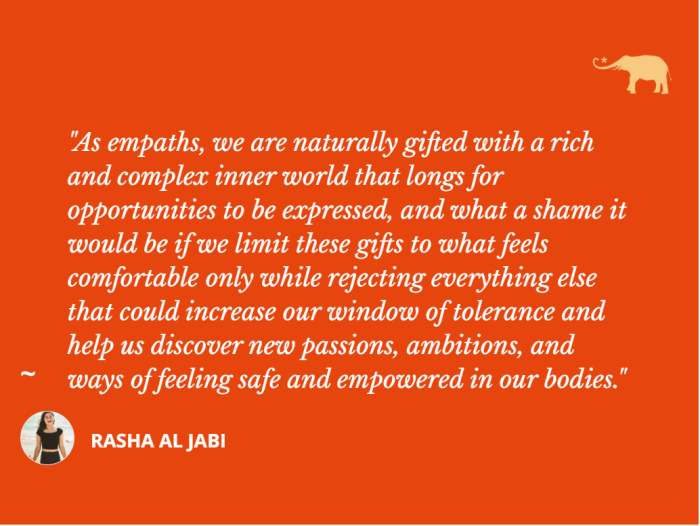The word “empaths” seems to be a hot topic that continues to crush the Internet headlines these days.
In fact, if you type in the word “empath” on Google search right now, here are the top suggested words that show up:
>> Empaths meaning
>> Empaths and narcissists
>> Empaths empowered
>> The Empath’s Survival Guide: Life Strategies for Sensitive People
…you get the idea.
There are tons of great articles that were written to define what an empath is, or on the toxic, irresistible attraction between empaths and narcissists, or on growing up with either one or two narcissistic parents, or on how to set boundaries as an empath, or on how to become an empowered empath, or on why empaths get easily drained.
And there’s a good reason for that.
According to this one article that cites a research study published in Nature Neuroscience, only one to two percent of the human population consists of true empaths, while another study through a functional magnetic resonance imaging (fMRI) has found that sensory processing sensitivity (SPS) was prevalent in about 20 percent of humans and over 100 other species.
Of course, as the field of neuroscience and fMRI continue to evolve, further research is being conducted to understand the qualities of an empath, what factors contribute to making a person empathetic, and what are the criteria that qualify for a true empath.
This also means that there’s a high chance that this tiny percentage of the human population feels rejected, misunderstood, or judged by the majority who might not have the awareness or be able to view the world from the intricate lens of an empath’s.
But what many studies continue to affirm is that the ability to empathize with or relate to others through exhibiting empathy is a learned process and can change throughout one’s life. Although in some cases, empathy can be linked to neuronal hyperactivity, wherein “the brain’s mirror neuron system—a specialized group of cells that are responsible for compassion—are hyperactive.”
My 10-year-old self feels immense gratitude for all the brain scientists who continue to revolutionize the way we—those of us doomed with neuronal hyperactivity and sensory processing sensitivity—understand, feel, and relate to ourselves, and, therefore, connect with and absorb the incessant stimuli coming in through our wider environment.
One of the definitions that I came across while trying to put into words what an empath is, is the following:
“A true empath is a person who is sensitive and highly aware of the feelings of others around them to a point of taking the pain and agonies of others as their own.” ~ Nereida Gonzalez-Berrios, MD
Being an empath is, of course, a great quality to possess. In today’s divided and hyper-political world, I believe we could all benefit from treating each other with a little more empathy, dignity, and humility. If each one of us today were able to pause for a second and feel what the other person is feeling before we respond, imagine how much unnecessary tension, aggression, and reactivity could be avoided. How empowered we can become by exercising our ability to take another’s perspective into consideration, even while we might eventually disagree.
But before we extend our ability to feel deeply and take another’s emotions, energies, and thoughts into our field of awareness, we must first learn how to feel ourselves.
One of the greatest acts of empowerment we can do as empaths is to understand how our brains, nervous system, and bodies work, and how they all intertwine with the wider web of our environment.
When we reclaim power over how our brain and nervous system are wired, we are better able to dismantle the feelings of shame and rejection that many of us carry as a result of not being able to fit in a world where being extroverted, loud, and sometimes even aggressive seems to be the norm and the only true path toward success.
On the other hand, we must be careful not to let the idea of being highly sensitive disempower us into retreating into our comfortable caves, where it might feel safe from the overwhelming pressure of the world; however, it is also a place where our voices are stifled, our gifts are secluded, and nothing ever grows.
As this quote by Anthon St. Maarten says, “Empaths did not come into this world to be victims, we came to be warriors. Be brave. Stay strong. We need all hands on deck.”
To be honest, as an empath, I have long ago released the narrative that kept me locked in feeling small, shy, and invisible over empowered, able, and gifted because of how overwhelmingly scary and loud everything around me felt.
I later came to discover that my feeling overwhelmed came not as a result of who or what or how I was as an empath, but more so because of my lack of personal boundaries and inability to filter people and external stimuli into my internal space—especially in romantic relationships where emotions, energies, and bodies often get enmeshed.
But if I am being honest, it took me years to finally reject all the articles that recommend that empaths shouldn’t expose themselves to environments or stimuli that are loud or bright or aggressive, and would be better off shielding themselves from anything that challenges them or overstimulates them, like watching the news or horror scenes.
As many great research shows, we can create new neural pathways and rewire our brains and nervous system through the amazing gift of neuroplasticity, by exposing ourselves to new experiences long enough until they become engrained in our daily habits.
And as empaths, we are naturally gifted with a rich and complex inner world that longs for opportunities to be expressed and manifested, and what a shame it would be if we limit these gifts to what feels comfortable only while rejecting everything else that could increase our window of tolerance and help us discover new passions, ambitions, and ways of feeling safe and empowered in our bodies.
For example, my recent discovery of Brazilian jiujitsu, an on-ground grappling sport that fuses elements of wrestling, strangling, choking, and joint locks—made me understand how tremendously empowering it feels to work with another human’s body—and how much confidence I can actually build by learning how to escape or defend myself in different life-threatening scenarios where I am being pinned down by a stronger (and much bigger) opponent.
Further, my passion for human psychology as a way to understand myself and, therefore, help other humans who are suffering made me realize that we can never understand the human experience without exposing ourselves to the darker side of humanity: aggression, violence, evil, narcissism, and grief.
And so, to say that empaths should seclude themselves in experiences that exclusively nourish them without exposing themselves to environments that might challenge them is an insult to the potential an empath can have as a result of their talents, gifts, and empathetic, caring nature.
And in a way, isn’t that the definition of toxic positivity, whereby we only invite what feels good and reject everything else that is slightly dark?
This reminds me of a beautiful quote by the legendary, great philosopher, Alan Watts:
“This, then, is the human problem: there is a price to be paid for every increase in consciousness. We cannot be more sensitive to pleasure without being more sensitive to pain.”
If I had one piece of advice to give my younger self, and every empath out there who feels the crushing weight of a loud, noisy, bright, extroverted, violent, and divided world, it would be this:
“Love who you are, fully. You are not over-reactive; you are not over-sensitive, you are not a mistake, and there’s nothing wrong with you. But in your quest to protect your sensitive, tender, sponge-like soul, don’t be afraid to live and enjoy life—even if it means experiencing things and people that pull you out of your comfortable, familiar, warm cocoon. In your quest to protect who you are, don’t forget that you have a life to live, and life becomes richer, fuller, and more expansive the more we allow ourselves to learn by embracing new experiments and making mistakes.”


 Share on bsky
Share on bsky






Read 14 comments and reply